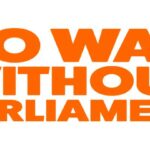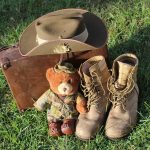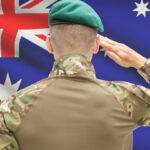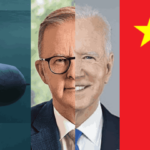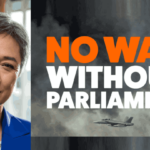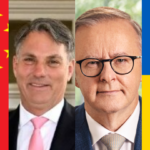Talking Peace on ANZAC Day: An Interview with Raising Peace’s James Cox
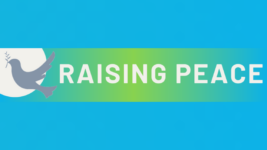
“Australia can become a global champion of peace” asserts a recently issued statement from Raising Peace for ANZAC Day 2024, in which the peace alliance network outlines that while remembering fallen soldiers, the reflection shouldn’t be through a “war first” lens.
These words resonate in particular this year, as the day prior to ANZAC Day marks 200 days of open genocide in Gaza, the war in Ukraine has continued for over two years and the nation of Australia still denies recognition of the colonial Frontier Wars.
“It is remarkable and distressing that Australians are being told that the lesson of ANZAC Day, built on a calamitous campaign at Gallipoli, is not that war is a disastrous endeavour, but rather that war is noble,” the statement makes clear.
“The trauma and moral injury of war remain unrecognised and unacknowledged.”
And Raising Peace are in no way suggesting that those who sacrificed their lives, or parts of them, in the theatre of war should not be remembered and recognised, but in doing so, the various peace organisations making up the network see the path forward as one where we “outgrow war”.
A land of increasing militarisation
Right now, the peace organisations making up Raising Peace are well aware that Australia is on track to fighting a war against China, the nation’s greatest trading partner, at the behest of the US, and so caught up in Washington’s foreign policy outlook are we, that it has simply become our own.
Australia has been steadily cruising on this trajectory since World War II: there was the 1960s imposition of US facilities at Pine Gap and North West Cape, and after that came the 2014 Force Posture Agreement, with its initiatives ever-increasing US military presence on this continent.
Yet, since former PM Scott Morrison dumped AUKUS on us in September 2021, this has all escalated.
And it hit overdrive after current PM Anthony Albanese announced the “AUKUS optimal pathway” in March 2023, and since then, the continent is taking on all the trappings of the 51st state of the USA.
The AUKUS bill for the nation is $368 billion: a conservative estimate. And Australia has just handed over $4.6 billion each to the US and the UK to invest in their submarine base on the off chance that our closest allies are able to first satisfy their defence needs, prior to producing anything for us.
And just to make sure we’re all well aware that Uncle Sam’s war path is our road ahead too, defence minister Richard Marles announced last week that the nation’s defence spend is going to increase from 2 percent of GDP to 2.4 percent by 2033-34.
Lest we get caught up in war
Raising Peace was founded in 2020, and it consists of 40-odd peace organisations. It was born out of a networking peace festival, and these events continue to be staged to raise the prospect of steering the ship towards peace. And First Nations voices have been leading the way.
“Australia is uniquely placed to become the world’s leading proponent of First Nations approaches to peacebuilding,” the Raising Peace statement ends.
“On ANZAC Day 2024, Raising Peace urges all Australians to remember the fallen and work for a peaceful future for all the peoples of the world.”
Sydney Criminal Lawyers spoke to James Cox, an organiser of the Raising Peace network, and also, the executive director of Peacifica, an organisation that advocates for peacebuilding in the South Pacific. And Cox told us of the path towards peace, which is already progressing in the community.
Raising Peace released a statement for ANZAC Day 2024, in which the organisation posits that whilst those that have died fighting on behalf of this nation in wars should be remembered, there are some issues with the way in which the nation does commemorate them at present.
James, after I read the statement and got in contact, it occurred to me that a decade ago such a statement wouldn’t have been floated around at this time of the year, and running an article like this on ANZAC Day wouldn’t have been contemplated either.
So, it seems that some sort of shift has occurred.
The statement does encapsulate a lot of what Raising Peace has learnt through our festivals that we’ve run over the last couple of years.
We’ve been hearing from various experts, and it occurred that people don’t ask the experts about peace.
They have expertise in various things, and they’re never asked to consider things from this angle, so they really jump at the opportunity.
We get the impression that people are embracing the chance to think about things in a different way – to frame the problems that we face in different ways – that is a lot of what we’ve been learning.
So, Raising Peace has suggested there are some problematic aspects to ANZAC Day and the remembrance of past wars in general. So, what are some of the issues around this?
For many people, ANZAC Day is still a day of remembrance, and this is especially true of those who have lost family members in war.
The ANZAC dawn services, in particular, remain this way. And anyone who has been to one can appreciate how genuine those moments can be.
But at the same time, the day has been increasingly used as a vehicle for pushing nationalism and the idea that Australia’s identity was forged in war.
This is compounded by the fact that the Australian War Memorial, as the focus of ANZAC Day, receives millions in sponsorship from weapons manufacturers.
So, how are we supposed to make sense of those competing narratives that we have: of remembering the past, but also, in investing in war and fuelling the institutions at the same time.
There is also a question of which wars get honoured. For decades, I understand that many Vietnam Veterans felt that ANZAC Day wasn’t for them, and this is still true for First Nations people today.
The experience of First Nations people and their ancestors’ experience of the Frontier Wars is not mentioned on that day.
If we want to reflect honestly on the cost of wars, we can’t pick and choose which wars to remember.
As you’ve already touched upon, one key issue is the selective acknowledgement and remembrance of only certain conflicts, and a key aspect to this is that Australia denies the existence of the Frontier Wars, which saw the British fight against substantial and widespread First Nations resistance to the invasion of their land.
So, can you expand on the issues that emanate from this denial to recognise the colonial Frontier Wars?
The most obvious starting point is that we are a nation with two unresolved versions of our history, and this might be described as settlement versus colonisation.
Settlement could imply a story of expansion of Europeans into land waiting to be claimed, which was the story we grew up with.
Colonisation, by contrast, speaks of a people and a place being taken over, with lands taken, place names changed and people swept aside.
We have a lot of evidence now to show that this process wasn’t a peaceful one. Colonisers moved in, First Nations people resisted, and the colonisers fought back brutally.
The tension between the peaceful expansion and the violent expansion is the one that we haven’t dealt with, and we live with these contradictions.
We need to admit to the violence in our national past, not only so we know who we are and where we came from, but much more urgently, because that violent past directly affects the lives of people now.
This is especially, but not only for, First Nations people. Trauma spans generations, and the loss of land, culture and knowledge spans generations.
First Nations people are still spending so much of their time and energy fighting back. So, it has this cost and this weight now.
Raising Peace asserts that “a nation that tries to found its identity on its military past risks engendering a ‘war first’ mentality in generations to come, rather than one that embraces peace”.
Could you elaborate on some of the issues that are emerging in this country because of this war first outlook?
We’re seeing this conflict first mentality explicitly in our politics. The AUKUS agreement is the most obvious example.
We have committed billions of dollars towards a defence strategy, and in particular, a submarine component, which is, by many accounts, destined to fail, even if the equipment arrives.
We are stuck in a relationship with countries that are on the other side of the world, rather than looking at our closer neighbourhood and thinking about how best to build security through stronger relationships, rather than weapons.
Australia was once good at that, but we’ve kind of forgotten how.
This conflict first mentality impacts more locally as well. I’m thinking about the punishing restrictions placed on Indigenous youth in Alice Springs after the violence there, which suggests that we’re not really capable of thinking in ways other than punishment and confrontation.
Those young people are being punished for things that are much bigger than themselves. It is an indication that our leaders don’t reach for tools of dialogue, mediation and peacebuilding. They reach for law and order.
We didn’t address the big global conflicts, such as Ukraine and Gaza, in that statement, but the way Australia has responded to those conflicts also reflects our war first mindset.
As a nation we should stand against violence, war crimes and brutality.
And while Australia did speak out at various times, did we ever discuss committing peacemakers or mediators to these conflicts?
Did we ever think about taking that next step? It never seems to occur to us.
The only response seems to be words and boots, rather than minds dedicated to peace.
There was a little bit of encouragement over recent days, in the ways that government was coming together, in response to the violence in Sydney last week: the stabbings.
Emergency bipartisanship on lessening confrontation and division in public debate and promoting inclusion, which is an encouraging beginning. More of that would be good.
Since the AUKUS pact was announced in September 2021, Australia seems to be on a path of enhanced militarisation, and since March 2023, when Albanese launched the AUKUS optimal pathway, this has intensified.
What are your thoughts on these attempts to basically make the Australian military interoperable with that of the US?
There might be arguments to be made for countries to share military capabilities in some instances.
But the US, in particular, is becoming an unpredictable ally and interoperability on something as expensive and dangerous as nuclear-powered submarines is a very risky way of ensuring our defence.
As far as we can tell, AUKUS now involves us sending more and more billions to the US and the UK just to support their programs.
So, how does Raising Peace consider this nation could change course and commence heading down a pathway toward peace?
This is the good thing about what we’ve learned from hearing people talk about their work over the last several years. There are various things that we can do. Some are big, and some are small.
The first one is that we need to build peace at home.
I was talking before about the legacy of conflict with First Nations people and European settlers, and last year, we baulked at the opportunity to set up an Indigenous Voice, but the Uluru Statement still calls for truth-telling and treaty.
This represents a wonderful opportunity for us. The Uluru Statement, overall, is one of the most potent peacebuilding proposals we can come across.
If we still pursue the spirit and some of the principles in that, we can start to heal some of those wounds that affect us all, and then devote our energies elsewhere.
We can also reconsider our geopolitical alignment. Many countries around the world are not aligned. And they find themselves security in other ways that don’t align themselves with one particular power.
This gives them greater freedom to act as peacemakers. Australia currently is intertwined in many different ways with the US and China, and we can be friends with both of them.
The current situation where we have strong security ties in one direction is particularly helpful, when we’re so closely related to both countries.
We also need to start thinking differently. This can start in our schools.
One Raising Peace member organisation, the Medical Association for the Prevention of War, released last year a great report called Minors and Missiles, which documents the ways in which weapons companies are influencing curriculums at schools and universities.
That’s a simple first step. Then we can take a second step by investing in peace education.
We can train ourselves to ask first, what is the best way to achieve a peaceful outcome for everyone, rather than, how do we get the best outcome for ourselves.
Those are some of the things that we can start to do. We can just start thinking and acting differently.
And James, in raising those peace alternatives to the current warpath both federal major parties have positioned the entire nation on, what sort of immediate changes are going to facilitate a shift in course? How can grassroot Australians begin this process that government is resisting?
This actually comes back to what you were saying earlier on, when you reflected on that ten years ago you mightn’t have been able to have this conversation around ANZAC Day, and that is, that we need to normalise talking about peace.
In this country, as a people, we are not very good at talking about peace.
One of the things that Raising Peace has found in our work is that we all have violence in ourselves, and we need to train ourselves to do things differently.
This isn’t impractical, but fostering peace within oneself is hard work. It’s not the easy way out.
But there are specifically tools that can help us to do this, and there are organisations supporting these processes.
But it is also achievable via small things that demonstrate the change.
Just a few days ago, after we first put our statement out there, I got an email from one of the people on our mailing list, and she was talking about how her daughter was making ANZAC biscuits, but she was calling them Peace biscuits.
And I thought that was a small but not meaningless way of reframing how we think about things.


